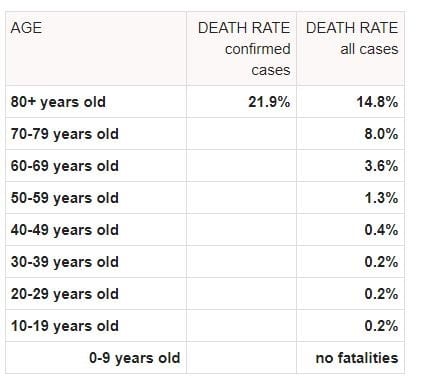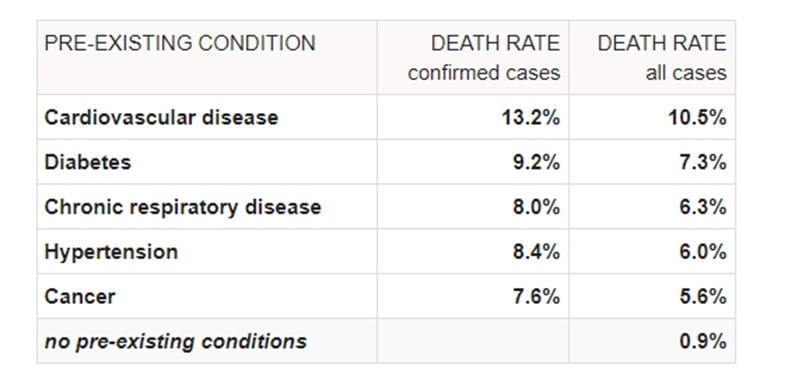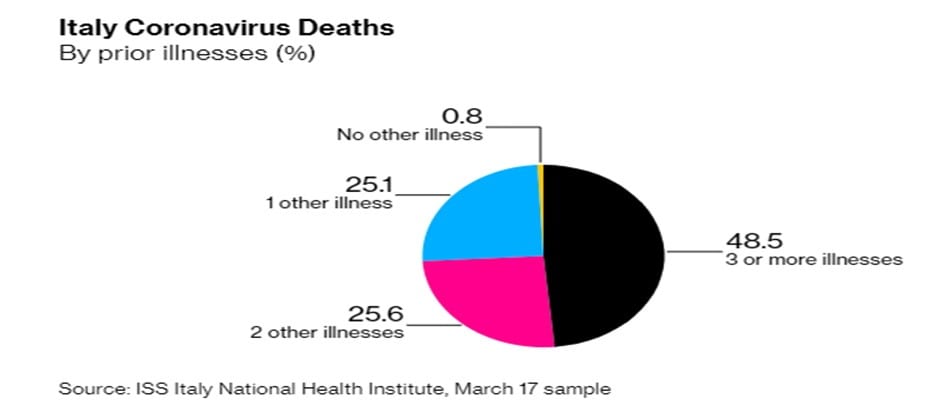
The Coronavirus: Separating Facts From Fear-Mongering And Overreacting
It’s clear that a sense of hysteria has gripped people across the US and beyond, and the ineptitude and stupidity of some elected officials have exacerbated the situation. Had the US taken a cue from South Korea and implemented more effective measures early on, we might have been able to prevent the situation from spiralling out of control. However, instead of taking decisive action, there was a delay in testing which fueled a sense of panic and chaos. It’s disheartening to think that despite our advanced medical technology and expertise, we could not respond more effectively to this crisis. Ultimately, it’s essential to learn from this experience and take steps to ensure we are better prepared for future health emergencies.
It’s essential to approach news about the coronavirus outbreak with a critical eye, especially regarding media coverage. While it’s true that there has been a spike in reported cases in New York, it’s also essential to consider the context of this increase. With more testing being done, it’s natural that more cases will be identified, so it’s not necessarily an indication that the situation is worsening. However, it’s concerning that some media outlets may be sensationalizing the situation or spreading misinformation rather than providing accurate and balanced reporting.

If you calculate the death rate, it works out to 1.28%, but instead of focusing on this, the press often spins the spike in coronavirus cases as something shocking. It’s important to remember that more testing can be beneficial in lowering the death rate as a larger group of people can be tested, including those who may have mild or no symptoms. However, the press tends to focus on the negative aspect or tries to make a manageable situation seem totally out of control, which can lead to public panic. This is especially evident in Italy, which is currently facing a concerning outbreak.
Despite the rise in victims, the death rate across all groups has hardly changed.

The table illustrates that those with preexisting conditions are the ones most at risk, and is current as of 2. P.M EST March 23, 2020

source:https://www.worldometers.info
What’s important to note is that the mortality rate drops to 0.9% across all age groups when individuals have no preexisting conditions. This fact should be emphasized instead of being buried in the news. Age alone is not the main factor. Instead, age and preexisting conditions are the main factors in determining the severity of COVID-19. Individuals can take necessary precautions and reduce their risk of infection or severe illness by focusing on these critical factors.
How Herd Behaviour Is Making The Crowd Overreact
It’s dismaying to witness the masses in America overreacting and behaving unbecomingly, as the multitude of orders and commands from various governors and agencies only foster more dread instead of a sense of hope. The markets aren’t declining due to underlying economic conditions but rather because individuals feel like no one knows what they’re doing. Hopefully, the rest of the US follows in NY’s footsteps and opens up mass testing centres.
The rampant spread of disinformation has prompted me to investigate the situation directly to offer Tactical Investors a clearer picture of what’s really happening. Despite the risk, I decided to fly solo to Asia without announcing my travels. My objective was to see if the West, including the US, was overreacting and if Asia was doing a better job of handling the situation psychologically.
When The Crowd Loses Its Mind: The Role Of Herd Behaviour In Overreaction
I’ve visited Vietnam, Malaysia, Cambodia, Singapore, and Indonesia. I can honestly say that Asia is doing a much better job of controlling the panic factor than we are in the US. People aren’t emptying shelves of goods; the only thing that seems to be selling like hotcakes are face masks. The contrast between how Asians manage the situation psychologically and how we manage it is staggering.
Take Jakarta, for example. They’re about to declare an emergency, but people aren’t panicking. Malaysia is closing its borders, but the most significant reaction was Malaysians working in Singapore rushing back home to gather extra supplies before returning to Singapore, where they plan to stay for an extended period. Many Malaysians commute daily from Singapore to Malaysia. If the border is closed, they won’t be able to return, so they take precautions to ensure they have enough clothing and other essentials for their extended stay in Singapore.
The Crowd’s Overreaction: A Psychological Analysis
It is crucial that leaders in the West, particularly in the US, take proactive steps to instil calm and reduce fear among the population. Heightened fear levels can lead to increased stress, which, in turn, weakens the immune system. Research indicates that stress can be deadly, especially for older individuals who often have preexisting conditions. Additional anxiety places an extra burden on an already weakened immune system.
Therefore, our leaders must take measures to reduce fear and provide accurate information about the situation at hand. By doing so, they can help to lower stress levels, which in turn can help to reduce the risk of illness and death. We must also take into account the importance of proper self-care, including adequate rest, exercise, and a healthy diet, to strengthen our bodies and immune systems during this challenging time
During acute stress lasting a few minutes, certain cells are mobilised into the bloodstream, potentially preparing the body for injury or infection during “fight or flight” [1]. Acute stress also increases blood levels of pro-inflammatory cytokines [2]. Chronic stress lasting from days to years, like acute stress, is associated with higher levels of pro-inflammatory cytokines but with potentially different health consequences [3]. Inflammation is a necessary short-term response for eliminating pathogens and initiating healing, but chronic, systemic inflammation represents dysregulation of the immune system and increases the risk for chronic diseases, including atherosclerosis and frailty [4]. Another consequence of chronic stress is the activation of latent viruses. Latent virus activation can reflect the loss of immunological control over the virus, and frequent activation can cause wear and tear on the immune system [5]. https://bit.ly/2U8Kjdi
Overreacting Or Rational? The Crowd’s Behaviour Explained
In addition, stress decreases the body’s lymphocytes — the white blood cells that help fight off infection. The lower your lymphocyte level, the more at risk you are for viruses, including the common cold and cold sores.
High-stress levels also can cause depression and anxiety, again leading to higher levels of inflammation. In the long-term, sustained, high levels of inflammation point to an overworked, over-tired immune system that can’t properly protect you. https://cle.clinic/3bct0xx
Ongoing stress makes us susceptible to illness and disease because the brain sends defence signals to the endocrine system, which then releases an array of hormones that not only gets us ready for emergency situations but severely depresses our immunity at the same time. Some experts claim that stress is responsible for as much as 90% of all illnesses and diseases, including cancer and heart disease. The way it does this is by triggering chemical reactions and flooding the body with cortisol that, among other things, decreases inflammation, decreases white blood cells and NK cells (special cells that kill cancer), increases tumour development and growth, and increases the rate of infection and tissue damage. https://bit.ly/2U9yNOw
Psychological stress
It has become well-accepted in recent decades that psychological stress can adversely affect many aspects of immune function (Glaser and Kiecolt-Glaser, 2005). However, the full health impact of stress may not be fully revealed until the effects of ageing are more widely appreciated. Chronic stress may speed the rate of normal age-related immune dysregulation (Kiecolt-Glaser and Glaser, 2001; Sapolsky et al., 1986). Moreover, age-related disease and impairment may augment the effects of stress or result in more significant clinical impairment for older individuals (Hawkley and Cacioppo, 2004; Kiecolt-Glaser and Glaser, 2001). https://bit.ly/2QyZqdw
Aging is associated with a natural decline in immune functioning. Immunosenescence is observed in many facets of both innate and adaptive immunity. For example, older individuals have a poorer natural killer cell (NK) response to stimulatory cytokines than younger individuals [1]. Ageing is also associated with impaired activation and proliferation of T- and B-lymphocytes [2]. Furthermore, the B-lymphocytes of elderly individuals produce fewer antibodies than those of younger individuals [3]. In addition, increased production of certain inflammatory mediators is observed during aging [4]. These immunological changes make older individuals more susceptible to various age-related diseases. However, immunosenescence appears to place older individuals at greater risk when combined with accumulating chronic illnesses, repeated infections, or other external factors [5]. Chronic stress may be one of the factors leaving elderly individuals more vulnerable to age-related diseases [6,7]. https://bit.ly/33y4pRg
Simple stress and immunity
In the early 1980s, psychologist Janice Kiecolt-Glaser, PhD, and immunologist Ronald Glaser, PhD, of the Ohio State University College of Medicine, were intrigued by animal studies that linked stress and infection. From 1982 through 1992, these pioneer researchers studied medical students. They found that the students’ immunity went down every year under the simple stress of the three-day exam period. Test takers had fewer natural killer cells fighting tumors and viral infections. They almost stopped producing immunity-boosting gamma interferon and infection-fighting T-cells responded only weakly to test-tube stimulation.
Those findings opened the floodgates of research. By 2004, Suzanne Segerstrom, PhD, of the University of Kentucky, and Gregory Miller, PhD, of the University of British Columbia, had nearly 300 studies on stress and health to review. Their meta-analysis discerned intriguing patterns. Lab studies that stressed people for a few minutes found a burst of one type of “first responder” activity mixed with other signs of weakening. All aspects of immunity went downhill for the stress of any significant duration – from a few days to a few months or years, as happens in real life. Thus long-term or chronic stress, through too much wear and tear, can ravage the immune system.
Stress suppresses the immune system.
It is true that stress can weaken the immune system, and this can be especially pronounced in older individuals with preexisting health conditions. When the body is stressed, it releases cortisol and other stress hormones, which can suppress the immune system and make it more difficult for the body to fight off infections. This can be particularly dangerous for older adults with weakened immune systems due to age or other health issues.
Furthermore, older adults may also be more prone to panic and anxiety, which can further increase their stress levels and negatively impact their immune function. This is why it is important for leaders and healthcare professionals to take a measured and calm approach to the current situation, in order to help prevent unnecessary panic and stress among the population.
Meta-analysis: Reveals Older people are more vulnerable
The meta-analysis also revealed that people who are older or already sick are more prone to stress-related immune changes. For example, a 2002 study by Lyanne McGuire, PhD, of John Hopkins School of Medicine with Kiecolt-Glaser and Glaser reported that even chronic, sub-clinical mild depression may suppress an older person’s immune system. Participants in the study were in their early 70s and caring for someone with Alzheimer’s disease. Those with chronic mild depression had weaker lymphocyte-T cell responses to two mitogens, which model how the body responds to viruses and bacteria. The immune response was down even 18 months later, and immunity declined with age. In line with the 2004 meta-analysis, it appeared that the key immune factor was duration, not severity, of depression. And in the case of the older caregivers, their depression and age meant a double whammy for immunity.
And viola that seems to be the case, so instead of trying to calm the population, the governments in the West are doing their best to stress out the older individuals that are already facing other stressful issues. For example, pensions that don’t cover the cost of living or inadequate medical help, etc.
Social Distancing Could Create Social Isolation
The researchers noted that lack of social support has been reported in the research as a risk factor for depression, an insight amplified in a 2005 study of college students. Health psychologists Sarah Pressman, PhD, Sheldon Cohen, PhD, and fellow researchers at Carnegie Mellon University’s Laboratory for the Study of Stress, Immunity and Disease found that social isolation and feelings of loneliness each independently weakened first-year students’ immunity. https://bit.ly/2Wzv2Ui
To top it, all experts have come up with the term social distancing, which is confusing to many, and so they have decided to come up with another term called Physical distancing.
According to Dr Maria Van Kerkhove of the World Health Organization, speaking at a virtual press conference on Friday, the move to use “physical distancing” comes from a desire to highlight “keeping the physical distance from people so that we can prevent the virus from transferring to one another.” https://bit.ly/3bdBzIg
Why invent all these phrases? Why not just say, hey, you know, for a bit of time it would be better if you don’t get too close to your older relatives as they are the most vulnerable, and this is just a temporary measure. This new term adds more stress to an already stressed out-group (the elderly). The most susceptible become even more vulnerable as their immune systems are further weakened as stress has been shown to reduce immunity.
The Word is Overreacting To The Situation In Italy

“The age of our patients in hospitals is substantially older – the median is 67, while in China it was 46,” Prof Ricciardi says. “So essentially the age distribution of our patients is squeezed to an older age and this is substantial in increasing the lethality.” A study in JAMA this week found that almost 40 per cent of infections and 87 per cent of deaths in the country have been in patients over 70 years old. And according to modelling the majority of this age group are likely to need critical hospital care – including 80 per cent of 80-somethings – putting immense pressure on the health system. https://bit.ly/3aacIoG
The manner in which the deaths are recorded in Italy leaves much to be desired. Anyone entering the hospital with a coronavirus diagnosis is deemed to have died due to the coronavirus. Preexisting conditions are not taken into consideration. Remember, an already weakened immune system now has to deal with two or three issues, and so to assume the death was due to the coronavirus is once again nothing short of voodoo science.
“On re-evaluation by the National Institute of Health, only 12 per cent of death certificates have shown a direct causality from coronavirus, while 88 per cent of patients who have died have at least one pre-morbidity – many had two or three,” he says. But there are other factors that may have contributed to Italy’s fatality rates, experts say. This includes a high rate of smoking and pollution – the majority of deaths have been in the northern region Lombardy region, which is notorious for poor air quality.
“Doctors in Italy haven’t been dealing with one or two patients in care… but up to 1,200,” says Dr Mike Ryan, health emergencies programme executive director at the World Health Organization. “The fact they’re saving so many is a small miracle in itself.” https://bit.ly/3aacIoG
The data above clearly highlights why Italy has such an abnormally high death rate and this article (clearly) confirms what all studies have already confirmed that those with already compromised immune systems are the most at risk.
More than 99% of Italy’s coronavirus fatalities were people who suffered from previous medical conditions, according to a study by the country’s national health authority. https://bit.ly/3bjhUHg
After deaths from the virus reached more than 2,500, with a 150% increase in the past week, health authorities have been combing through data to provide clues to help combat the spread of the disease. https://bloom.bg/2J6TG6I
Once again, one sees how the media goes out of its way to scare the populace into thinking the world is about to end. 99% of those that died already had an existing condition, and most of the deaths occurred in one of Italy’s most polluted areas. If you factor in those with no preexisting disorders/conditions, the death rate drops to 0.8%. Why is the press not highlighting this issue? Why do they insist on panicking the old, the most vulnerable individuals in the population? Are they trying to hide something, or are the doctors just too overworked to do the extra work? Time will tell.
Things you can do to boost your immune system
Before we continue, I want to clarify that we are not advocating or stating that you should take any of the supplements listed below. We provide data for you to analyse as always; our stance will forever remain the same. We don’t tell people what to do, we provide data, and then you decide how to use that data. If you disagree with some or all of the information listed below, that is your right, and we will not argue with you.
- Listen to calming music.
- If you must practice social distancing, you can always pick up the phone or use skype or WhatsApp to talk to a loved one or friend. Don’t sit alone and panic; talking about an issue helps relieve stress.
- Supplements that are helpful and that we are ourselves are taking
- Vit A, Vit D, and Zinc are good for boosting the immune system. A bit of Vit C can also be helpful.
- Olive leaf extract: Natural antiviral agent
- B complex: has many benefits, one of which is to help one cope with stress.
How Do Play the Coronavirus Pandemic in Terms of the Stock Market
This hysteria-based sell-off is producing one of the most significant buying opportunities in decades; more on that later. The short-term technical analysis cannot identify support levels because we are dealing with madness, which is why we added the new standard to the anxiety index. Very little liquidity exacerbates the situation; look at the bid and ask price on some unreal options, for example, an offer of 1.40 and an ask of 5.00. This allows a few big players to move the markets in whatever direction they see fit.
There is one massive indicator validating the outlook that this current makes for a great opportunity. It’s insider activity, and the readings on this indicator are off the charts.
Insiders have been using this massive pullback to purchase shares, and one way to measure the intensity of their buying is to check the sell-to-buy ratio. Any reading of 2.00 is considered normal, and below 0.90 is considered exceptionally bullish. So what do you think the current ratio is; well, it’s at a mind-numbing 0.35, which means these guys are backing up the truck and purchasing shares.
So what are the readings today? Based on very heavy transaction volume, Vickers’ benchmark NYSE/ASE One-Week Sell/Buy Ratio is 0.33, and the Total one-week reading is 0.35. Insiders are not just buying shares, they are devouring shares. Insiders behaved in a similar fashion in late December 2018, after stocks crashed on Christmas Eve; in early 2016, when stocks also corrected; and in late 2008/early 2009, at the depths of the Great Recession correction. Those were spectacular times to buy stocks. Insiders seem to be telling us that today offers a similar opportunity. https://yhoo.it/2TV0cE2
References
Research on how higher levels of stress affected the covid outcome for people. According to some web search results, here are some findings:
- A new study has found that people who experienced increased stress, anxiety and depression at the start of the pandemic were at greater risk of getting Covid-191.
- When people have chronically high levels of cortisol from being stressed, they end up with lots of inflammatory cytokines, which have been noted in severe cases of Covid-19, as have lower levels of lymphocytes, the white blood cells that help fight infections2.
- Elevated COVID stress is also associated with greater stigmatization of healthcare workers, and a significant proportion of the population with pre-existing anxiety disorders experience more negative effects than those with depressive disorders or no mental health conditions3.
- The prolonged stress experienced by adults, especially the high levels of stress reported by Americans directly linked to the pandemic, is seriously affecting mental and physical health, including changes to weight, sleep and alcohol use4.
- During the COVID-19 pandemic, you may experience stress, anxiety, fear, sadness and loneliness. And mental health disorders, including anxiety and depression, can worsen. Surveys show a major increase in the number of U.S. adults who report symptoms of stress, anxiety, depression and insomnia during the pandemic, compared with surveys before the pandemic5.
Other articles of interest
Mass Hysteria Equates To Stock Market Opportunity (March 25)
Hysteria Definition Equals Overreaction To The Coronavirus (March 23)
Trading The Markets & Investor Sentiment (March 3)
Coronavirus Update: A Whole lot of noise about nothing (Feb 29)
Volatility Index Readings & Stock Market Trends (Feb 22)
Brain Control: Absolute Control Via Pleasure (Jan 20)
Indoctrination: The Good, The Bad and the Ugly (Jan 15)
Dow Transports Validating Higher Stock Market Prices (Dec 30)
Global Trading Volume is Declining & It’s A Non Event (Dec 20)
Dogs Of The Dow Jones Industrial Average (Dec 10)
Trump Stock Market: Will Impeachment Hearings Derail This Bull (Nov 21)
Negative Thinking: How It Influences The Masses (Nov 15)
Leading Economic Indicators: Finally in Syn With The Stock Market? (Oct 28)
Dow Stock Market Outlook: Time To Dance or Collapse (Oct 25)
What Is Fiat Money: USD Is Prime Example Of Fiat (Oct 13)
Yield Curve Fears As Treasury Yield Curve Inverts (Oct 12)
Current Stock Market Trends: Embrace Strong Deviations (Oct 2)


